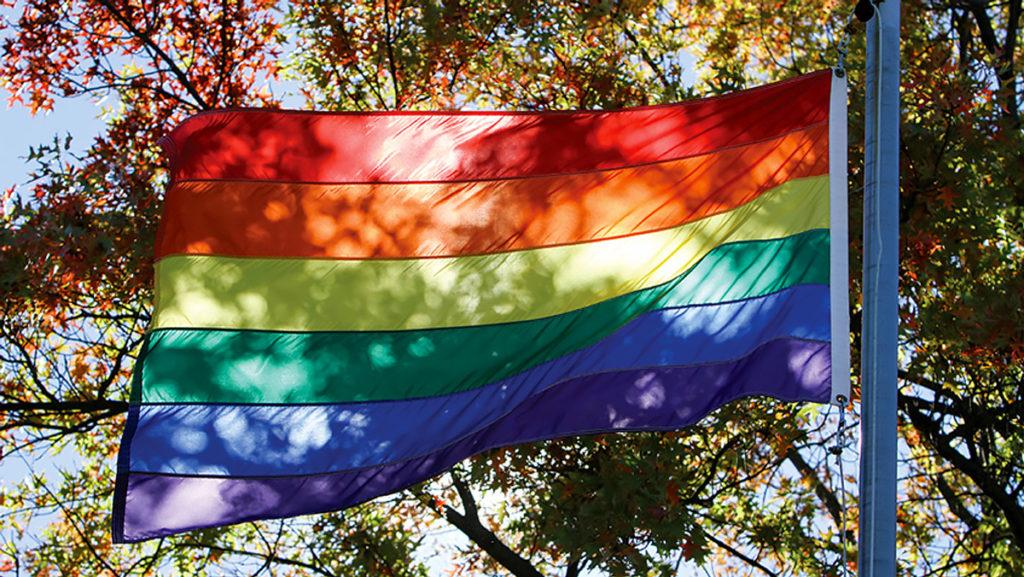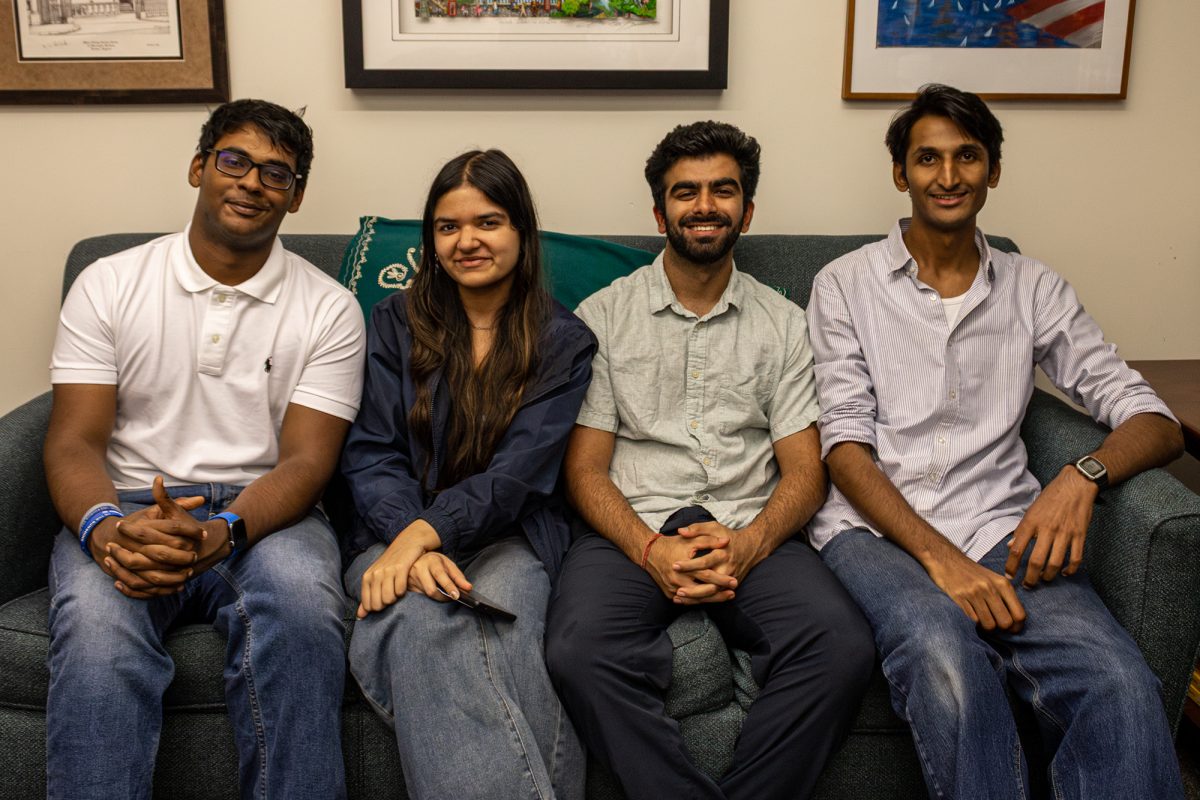Last year, senior John Jacobson said they felt there weren’t many on-campus opportunities to discuss the lesbian, gay, bisexual, transgender and queer experience. To bridge the gap between them and their peers, Jacobson coordinated ZAP panels, or LGBTQ-oriented discussion events, with Matt Dankanich ’15, to share stories about what it means to be a member of the LGBTQ community.
“We work with our peers who we know very well and try to tell our narratives in the hopes of giving people … an understanding that being LGBT is a very wide-ranging experience that often comes with various sets of oppressions depending on who you are,” Jacobson said.
Shortly after, Jacobson and Dankanich ’15 were awarded the Harvey Milk Award — which honors students who work to increase LGBTQ awareness on campus — at the annual Rainbow Reception, an event that honors Ithaca College seniors and graduate students of the LGBTQ community.
At 7 p.m. on April 21, Ithaca College will hold its 15th annual Rainbow Reception in the Clarke, Klingenstein and McDonald lounges in the Campus Center. This year, Devon Ritz-Anderson ’12, who currently works as a sexuality educator and transgender patient navigator at Planned Parenthood of the Southern Finger Lakes in Ithaca, will be the alumni speaker.
Luca Maurer, Ithaca College’s LGBT Education, Outreach and Services program director, will also speak at the event. Maurer will be talking about the history of the event before honoring the college’s students.
During the Rainbow Reception, three awards will be presented, two of which honor famous people from the LGBTQ community.
The Harvey Milk Award honors Milk, the first openly gay person to be elected to public office in California, serving as a San Francisco supervisor. The Sylvia Rivera Award recognizes the efforts of any student whose efforts were directed at service for LGBTQ communities. Rivera was a founding member of the Gay Liberation Front and of Street Transvestite Action Revolutionaries, a group that helped homeless trans women and women of color in the 1960s. There is also an LGBT Ally Award, given to any member of the campus community who has outwardly shown support to the college’s LGBTQ community.
Maurer said that in the 1990s, Ronni Sanlo, director of the University of California, Los Angeles, LGBT Campus Resource Center, realized that despite the struggles of many LGBTQ college students, there was no culturally specific way to acknowledge their completed degrees and celebrate their accomplishments. In response, Sanlo created an event called Lavender Graduation, a ceremony to honor LGBTQ individuals and recognize their endeavors. Since the first Lavender Graduation in 1995, several hundred schools across the country have borrowed the idea, holding annual ceremonies honoring LGBTQ youth.
Similar to other college events, at Ithaca College’s Rainbow Reception, the seniors will receive rainbow honor cords, and the graduate students will receive rainbow stoles.
Senior Gillian Wenzel, vice president of Spectrum, said the event allows students to celebrate their achievements without restrictions faced by the LGBTQ community. Spectrum is a student organization that supports the rights of all sexual orientations and gender identities.
“To me, [the Rainbow Reception] means a celebration that is very specific in understanding the ways in which our experiences on campus might differ from the general campus, as well as providing a space for people who might not be out to their families, to be able to celebrate within the community and wear what they want, and feel honored even if they have to police some of their behavior at actual graduation,” Wenzel said.
In addition to the award presentation, students get the opportunity to speak at the Rainbow Reception. Maurer said that during their speeches, some students thank their parents, significant others or staff members. Others may testify their struggles.
“The character of the event is that a lot of emotions happen in that room … ranging from just complete celebration, to some people recounting some difficult experiences they’ve had either here or to get here,” Maurer said.
Maurer said there have been instances where students did not receive support from their families at the Rainbow Reception. Before the first Rainbow Reception, a student spoke to Maurer about how no one would applaud them at the Rainbow Reception. In response, Maurer contacted Parents, Families and Friends of Lesbians and Gays to help the student and others facing similar difficulties.
The members of PFLAG agreed to attend and serve as “stand-in parents” to clap for the students whose parents were unable to or would not attend the ceremony. Every year, for the last 15 years, PFLAG parents come to the Rainbow Reception.
Regardless of parental support, Ritz-Anderson said the Rainbow Reception is a safe space for people to celebrate their true selves.
“It’s also a time to acknowledge the work that students have done within the LGBTQ community — not just directly in the LGBT center or the LGBTQ groups that are on campus, but how they’ve been ambassadors in their own right, in their own department, just by being who they are and really advocating for everybody’s visibility and everybody’s comfort and affirming in their identity,” she said.
Wenzel said the LGBTQ community has been one of the most important parts of their college experience.
“I am looking forward to Rainbow Reception and have been experiencing a lot of reflection … over the past four years, and how individuals at IC have helped me become a more fearless version of myself,” Wenzel said.
One of the main goals of the Rainbow Reception is to advocate for everyone’s presence in the community and surround students of the LGBTQ community with people who support them, Ritz-Anderson said.
“I hope they get a feeling of community, a feeling that who they are, in every single facet of their identity, is amazing,” Ritz-Anderson said. “No matter where they go after they graduate … there are people that are rooting for them, that care about them, that believe in them and that want to see them succeed.”
Jacobson said the event is more than a ceremony — it’s a celebration of functionality in a society that typically represses the LGBTQ community.
“It becomes a little bit different than a celebration at a traditional graduation ceremony because there’s that celebration of success and … survival,” Jacobson said.
Attendees are required to complete the online registration form before attending the Rainbow Reception to guarantee food and seating.














